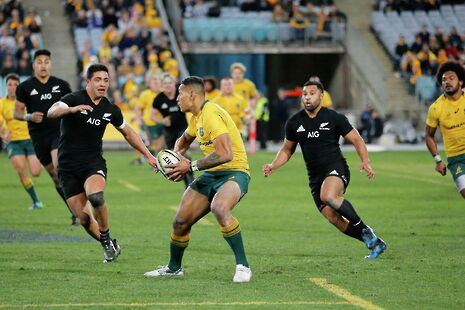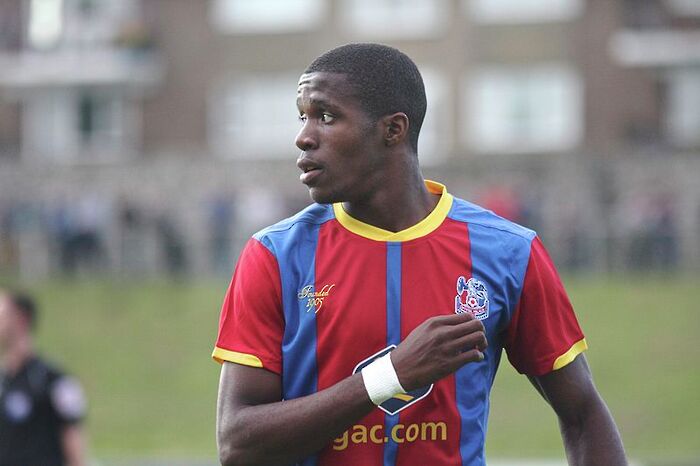Israel Folau’s dismissal sets a positive precedent, but there is much further to go for homophobia in sport
Rugby Australia’s decision can hardly be called a victory in an industry still beset with homophobia, argues Oliver Winters

CN: This article contains references to homophobic abuse and suicide
Last year, Israel Folau received an official warning from Rugby Australia after a homophobic outburst on social media. Folau has since repeated this behaviour, this time writing in an Instagram post shared earlier this month that gay people would “go to hell”. He has since been dismissed by Rugby Australia subject to a ‘code of conduct’ hearing. In an official press release, Rugby Australia stated that Folau “had committed a high-level breach of the Professional Players’ Code of Conduct warranting termination of his employment contract”.
The move by Rugby Australia would appear to be a positive one. Indeed, last year I held that Rugby Australia should demonstrate that homophobia has no place in sport and that while Folau has a right to his own freedom of expression, any national sporting body has an obligation to disavow anyone who propagates homophobia. I maintain that Rugby Australia has of course made the right decision. However, the result of Folau’s actions represents a victory for no one.
Firstly, Folau’s actions, as a prominent member of the Pacifica community, amount to an attack by one marginalised group on another, the result of which could hit those whose identities sit at the cross-section between both groups the hardest. His sacking runs the risk of creating a martyr for homophobic views, and if this risk should materialise in the Pacifica community, this could come at the greatest expense of the queer Pacifica community.
Second of all, that Folau’s sacking occurred at the point where Rugby Australia had no choice is arguably emblematic of the wider issue of legitimising homophobia in rugby. Welsh international player Taulupe Faletau ‘liked’ Folau’s post, and was subsequently told he would ‘face further action’, although this is yet to be forthcoming. England Number 8 Billy Vunipola has faced criticism for actively defending Folau by claiming that “man was made for woman”: the RFU have stated that these comments are not in the interests of the ‘inclusive’ nature of rugby. At the time of writing, Vunipola’s post remains active on social media.
“That Folau’s sacking occurred at the point where Rugby Australia had no choice is emblematic of a wider issue”
Whether or not the WRU and RFU follow Rugby Australia’s lead, it appears that some see no place for homophobia within the sport. In his last two appearances for Saracens, Vunipola was booed by fans. Moreover, former England and current Harlequins prop Joe Marler and England and Northampton Saints back-row James Haskell have openly criticised Folau and Vunipola’s bigotry on social media.
Rugby is one of the most progressive mainstream sports in the world: former Wales captain Gareth Thomas and Welsh international referee Nigel Owens are two prominent openly gay figures in the sport, and England internationals such as Ben Cohen and James Haskell have endeavoured to draw attention to the problem of homophobia in rugby. While this high- profile incident of homophobia has left many rugby fans outraged,in a climate where homophobia in the sport is still alive and well, it is at least commendable that Rugby Australia are taking a stand.
But with other sports are still dramatically lagging behind, rugby could be seen as comparatively progressive. With recent focus in football rightly being laid on racist abuse, we should not forget that professional football still has very few openly gay players, with no openly gay players in any of the major European leagues. The only openly gay player in the history of Premier League was Justin Fashanu, who committed suicide eight years after coming out, having been subject to torrents of homophobic abuse. More recently, Olivier Giroud and Hector Bellerin have both stated that football is simply not ready for an openly gay player. Bellerin has admitted being subject to homophobic abuse as a result of his love of fashion.
In cricket, Joe Root was commended for standing up to West Indian bowler Shannon Gabriel’s homophobic jibe during a Test Match, telling him that ‘there’s nothing wrong with being gay’. The ICC subsequently banned Gabriel for 4 matches, though many believe it should have gone further. Notably, the punishment sits uncomfortably with the fact that the Test Match took place in St. Lucia, where the punishment for same-sex activity is up to ten years imprisonment.
With the recent protests at Parkfield School over LGBT+ inclusive Sex and Relationship lessons, it is important that we reevaluate how homophobia is viewed and addressed today. Sport plays a hugely valuable role in shaping cultural ideas and perceptions, particularly among young people. Growing up as an avid cricketer and footballer, I idolised the likes of Stuart Broad and Joe Hart as role models: no doubt coming to terms with my sexuality as a teenager would have been damaged had one of them emulated the actions of Folau. I still remember being hugely inspired by a talk given at my school by Ben Cohen concerning homophobia, bullying and his experiences in rugby. It is hugely important that governing bodies follow Rugby Australia’s lead in showing younger generations that homophobia is not legitimate within sporting communities. But let us not assume that what has happened to Folau is a victory by any means: we can only hope that one less platform for intolerance within sport will have a positive effect on shaping the views and opinions of the generations that look up to them.
 News / Clare Hall spent over £500k opposing busway 24 December 2025
News / Clare Hall spent over £500k opposing busway 24 December 2025 Comment / The ‘class’ of Cambridge24 December 2025
Comment / The ‘class’ of Cambridge24 December 2025 News / Caius mourns its tree-mendous loss23 December 2025
News / Caius mourns its tree-mendous loss23 December 2025 Comment / League tables do more harm than good26 December 2025
Comment / League tables do more harm than good26 December 2025 News / Girton JCR publishes open letter expressing solidarity with Palestine25 December 2025
News / Girton JCR publishes open letter expressing solidarity with Palestine25 December 2025









